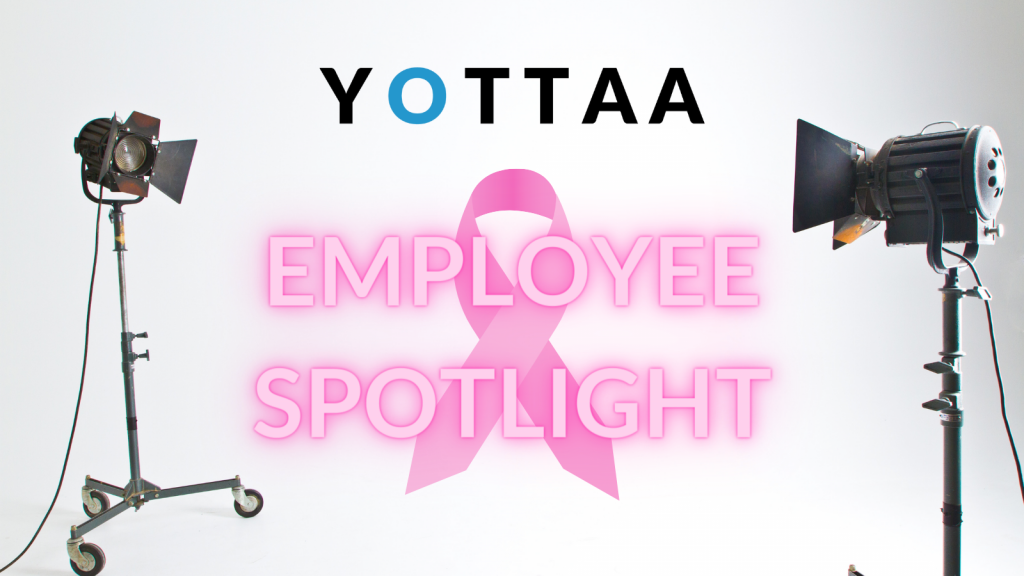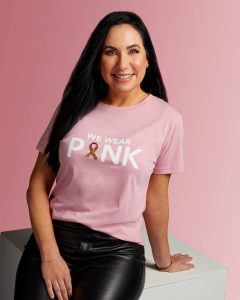
Employee Spotlight Special Edition: Cheryl Donahue, VP of Worldwide Sales

This Special Edition of the YOTTAA Employee Spotlight blog is shining on Cheryl Donahue, VP of Worldwide Sales. October is Breast Cancer Awareness Month, and Cheryl is just a few months away from being a 5-year survivor. She was recently interviewed in Boston Proper, and we’re pleased that she is sharing her story with us as well.
How long have you been with YOTTAA?
I joined YOTTAA on January 19, 2021 which is a little ironic because it’s also my cancer-free anniversary.
Why did you choose a career in sales?
I’m not sure if I chose sales or if sales chose me. My original plan was to be a ballerina. After I graduated from high school, I was pursuing a career in ballet and I got injured. It was about a nine-month recovery and during that time my life changed. I enrolled in college and started working part-time in a role similar to what our Business Development Reps at YOTTAA do. From there it was a natural progression.
What do you like about working in sales?
I’ve always been in software sales and I like the challenge of working with customers to find the business solutions they need. It’s a great way to help people and it’s never exactly the same, so it keeps things interesting. I also enjoy mentoring others to become great sales people who can help their customers succeed.
How was your breast cancer discovered?
It was at my annual mammogram. There’s a history of breast cancer in my family, so I started having mammograms early, and I always made sure to get them on time. But everyone should get mammograms, family history or not. Nearly 90% of cancers are not hereditary. Even with a family history, the cancer I had wasn’t hereditary.
What was your first reaction to the diagnosis?
Of course, it was a tough conversation; but I immediately went into “fix-it mode.” My focus was on getting rid of the cancer. I found an oncologist that I connected with and then we assembled the team that would treat me.
Where did you receive treatment and which treatment did you choose?
I was living in Austin, TX at the time, and even now after almost 5 years, I still travel back to Austin for my follow-up appointments. Seeing my oncologist is like seeing a family member or close friend.
I chose radical treatment because it was right for me. Someone else might choose a different approach based on their own circumstances. The only “right” is what is right for you. I was diagnosed with triple negative breast cancer which has the highest rate of recurrence. My attitude was that I was only going through this once. Additionally, I wanted to avoid radiation and taking the “cancer pill” for the rest of my life, if I could. I knew my body could only take so much, and I chose treatment keeping that in mind. With guidance from my doctors, we decided on 6 months of chemotherapy before surgery. This allowed my team to learn about my cancer and watch how it reacted to treatment. My chemo plan consisted of treatment every other week for two months and then every week for the remaining 4 months. Once I was finished with treatment, I had a bilateral mastectomy.
How did you juggle family and career with treatment and recovery?
I tried to keep everything as normal as possible. When I was receiving chemotherapy, I brought my laptop to treatment and worked during the infusions. I couldn’t travel during treatment, but I kept working. My team really stepped up to support me in all ways. They picked up necessary travel for me, delivered care packages and didn’t miss a beat with business as usual. While we no longer work together, we are great friends and they will always hold a special place in my heart.
A big challenge was that I was diagnosed shortly before my daughter entered her freshman year in college. She didn’t want to leave, but I made her go. It was important to me that we all kept our lives on track. It was hard for her, but we stayed in close touch. My son, who was in high school at the time, gave her honest updates on how I was doing.
What kept you moving forward?
As far as I was concerned, recovery was the only option. I was on a mission, doing whatever I had to do to beat the cancer. I also never felt alone; family, friends, and colleagues all offered strength and support consistently.
How did you battle negative thoughts and protect your mental health?
One thing that was very hard for me was that I couldn’t work out. Exercise had always been my stress relief and to not have that release impacted me. But I turned to journaling which helped a lot, and it’s still a part of my life. I also spent time with friends, enjoying their company and having fun.
What have you learned from this journey?
I believe that everything happens for a reason, and my diagnosis was an eye-opener for me. I wanted to make sure that I took away what I needed from the journey I was on. I’ve learned to put myself first, which isn’t always easy to do. I’m more mindful, focusing on people and things that fill me up and add to my life. Everything I choose to do now has purpose and meaning and is something I’m passionate about.
What advice can you offer to anyone dealing with a serious illness?
Find your medical team — doctors you connect with and trust. If you don’t feel comfortable with your doctor, that’s not the right doctor for you. Look until you find the right one.
When you have questions, always ask, even if you have to ask the same question several times. Your medical team are the experts and you’re likely hearing a lot of information for the first time. Bring a notebook to appointments and write things down because it’s very hard to remember all the information you get at appointments.
Take care of yourself both physically and mentally. Eat well, exercise when you can, even if it’s just going for a short walk. Surround yourself with positive energy. Allow yourself to feel and process all the emotions you experience and don’t bottle them up.
Lastly, keep your doctor’s appointments and be your own advocate. Remember that you’re in charge.
Interested in working for YOTTAA? Check out our Careers page to see all open positions!
